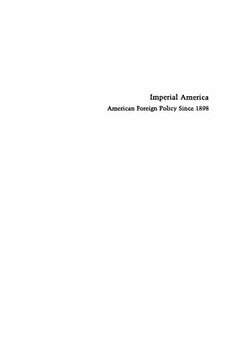
Imperial America: American Foreign Policy Since 1898 PDF
Preview Imperial America: American Foreign Policy Since 1898
Imperial America American Foreign Policy Since 1898 THE HARBRACE HISTORY OF THE UNITED STATES Imperial America American Foreign Policy Since 1898 Lloyd C. Gardner Rutgers University Under the General Editorship of John Morton Blum, Yale University HARCOURT BRACE JOVANOVICH, INC. New York Chicago San Francisco Atlanta Frontispiece: 1904 Cartoon, The American Imperial Eagle by Joseph Keppler, The Granger Collection ©.1976 by Harcourt Brace Jovanovich, Inc. All rights reserved. No part of this publication may be reproduced or transmitted in any form or by any means, electronic or mechanical, including photocopy, recording, or any information storage and retrieval system, without permission in writing from the publisher. ISBN: 0-15-540896-8 Library of Congress Catalog Card Number: 75-35326 Printed in the United States of America Copyrights and Acknowledgments Faber and faber ltd for a selection from "Burat Norton" in Four Quartets by T. S. Eliot, copyright, 1943, by T. S. Eliot, copyright, 1971, by Esme Valerie Eliot. Reprinted by permission of Faber and Faber, Ltd. HARCOURT BRACE JOVANOVICH, INC. for a selection from "Burnt Norton" in Four Quartets by T. S. Eliot, copyright, 1943, by T. S. Eliot, copyright, 1971, by Esme Valerie Eliot. Reprinted by permission of Harcourt Brace Jovanovich, Inc. Page 289 constitutes a continuation of the copyright page. Preface Time present and time past Are both perhaps present in time future, And time future contained in time past. If all time is eternally present All time is unredeemable. What might have been is an abstraction Remaining a perpetual possibility Only in a world of speculation. What might have been and what has been Point to one end, which is always present. T. S. Eliot "Burnt Norton" Historians do debate the might-have-beens, sometimes with their protagonists and sometimes with each other. And if they are con sidering as controversial a subject as "Imperial America," the temp tation to indulge in a running argument with the past becomes all but irresistible. What is more important to a reader, however, is the historian's endeavor to draw distinctions and make connections. The most difficult of these concern relationships between descrip tion and analysis, explanation and justification, and exposition and interpretation. The historian resolves these often subtle tensions by reference to specific materials and with the aid of a general framework. But the reader is by no means obliged to accept the result as the final word on any subject. Indeed, if the dialogue between historian and reader fails to encourage serious debate, both will lose. This book focuses on the relationship between policymakers, their ideas, and their institutions. My premise is that history is not v a summary of statistical findings, however useful those may be as tools. Perceptions of reality may depend as much on a special (even mythical) view of the past as on current facts. It is the policymaker's task to seek some rational integration of the two that will do vio lence to neither and keep society intact. Thus a nation's leaders may decide a given issue purely in terms of ideology, but their de cision must be explainable in terms of practical advantage. For good or ill, this process helps to shape what is possible in the future. People interact with the past continuously; they are affected by it; and their perceptions of it change. This could hardly be other wise. History is taught in schools to make that interaction socially useful. Revolutionary societies are usually the most adamant about imposing limits on what is taught about the past. The old order's history is often not only unsuitable to the present, but a dangerous counterrevolutionary weapon. Teaching about the American Revo lution has not been an exception, but the liberal-democratic society that evolved from that revolution has managed better than its rivals to keep open the possibility of coming to terms with its past, a not unimportant accomplishment. Finally, this book is concerned with American leaders' percep tions of this nation's international role in the twentieth century, the origins of their views, and the way they have grappled with domestic social and political imperatives in an effort to make sense out of the world and to preserve what they believe to be essential institutions. In one sense, it is about the quest to make the world safe for democracy, but it is also about international competition and rivalry. I am indebted to several friends and scholars who read the manu script and pointed out where I was more than usually cryptic or just plain wrong. John Morton Blum of Yale University, the General Editor of this series, Diane Shaver Clemens of the University of California at Berkeley, George C. Herring of the University of Kentucky, Walter LaFeber of Cornell University, and Joan Hoff Wilson of Sacramento State College read the original draft and made perceptive comments, most of which I have tried to incorporate into the final version. I would also like to thank William J. Wisneski of Harcourt Brace Jovanovich, who kept after me to get the book written, and three super editors, Irene Pavitt, Alexandra Roosevelt, and Kay Reinhart Ziff, who took over from there. I alone am re sponsible, of course, for any and all errors as well as for the inter pretation. LLOYD C. GARDNER To my students at Rutgers
